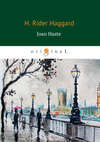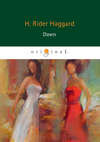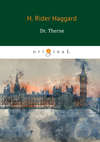Kitabı oku: «Joan Haste», sayfa 6
“Well, if you want to know, because I think him insufferable. I cannot make out how a lady like yourself can marry such a man just for – — ” and he stopped in time.
By this time Ellen was seriously angry, and it must be admitted not altogether without cause.
“Really, my dear Henry,” she said, in her most bitter tones, “I am by no means sure that the epithet which you are so good as to apply to Mr. Milward would not be more suitable to yourself. You always were impossible, Henry – you see I imitate your frankness – and certainly your manners and temper have not improved at sea. Please let us come to an understanding once and for all: I mean to marry Mr. Milward, and if by chance any action or words of yours should cause that marriage to fall through, I will never forgive you. On reflection you must admit that this is purely my own affair. Moreover, you are aware of the circumstances of our family, which by this prudent and proper alliance I at any rate propose to do my best to improve.”
Henry looked at his stately and handsome sister and the cold anger that was written on her face, and thought to himself, “On the whole I am sorry for Milward, who, whatever his failings may be, is probably an honest man in his way.” But to Ellen he said:
“I apologise. In nautical language, I come up all I have said. You are quite right: I am a bear – I have often thought so myself – and my temper, which was never of the best, has been made much worse by all that I have seen and learned since I returned home, and because I am forced by duty to leave my profession. You must make allowances for me, and put up with it, and I for my part will do my best to cultivate a better frame of mind. And now, Ellen, I offer you my warm congratulations on your engagement. You are of an age to judge for yourself, and doubtless, as you say, you know your own business. I hope that you may be happy, and of course I need hardly add, even if my prejudice makes him uncongenial to me, that I shall do my best to be friendly with Mr. Milward, and to say nothing that can cause him to think he is not welcome in our family.”
Ellen heard and smiled: once more she had triumphed. Yet, while the smile was on her face, a sadness crept into her heart, which, if it was hard and worldly, was not really bad; feeling, as she did, that this bitterly polite speech of her brother’s had shut an iron door between them which could never be reopened. The door was shut, and behind her were the affectionate memories of childhood and many a loving delusion of her youth. Before her lay wealth and pride of place, and every luxury, but not a grain of love – unless indeed she should be so happy as to find the affection whereof death and the other circumstances of her life and character had deprived her, in the hearts of children yet to be. From her intended husband, be it noted, when custom had outward his passion and admiration for her, she did not expect love even in this hour of her engagement, and if it were forthcoming she knew that from him it would not satisfy her. Well, she knew also if she had done with “love” and other illusions, that she had chosen the better part according to her philosophy.
Chapter 8
Two Conversations
On arriving at the Hall, Ellen went at once to her mother’s room, while Edward retired to the library, where he was informed that Sir Reginald was to be found. Lady Graves received the news of her daughter’s engagement kindly, but without emotion, for since her son’s death nothing seemed to move her. Sir Reginald was more expansive. When Edward told him that he was engaged to Ellen, he took his hand and shook it warmly – not, indeed, that he had any especial affection for that young man, whose tone and manners did not chime in with his old-fashioned ideas of gentlemanly demeanour, but because he knew his wealth to be large, and rejoiced at the prospect of an alliance that would strengthen the tottering fortunes of his family.
Edward had always been a little afraid of Sir Reginald, whose stately and distant courtesy oppressed him, and this fear or respect stood the older man in good stead on the present occasion. It enabled him even to explain that Ellen would inherit little with as much dignity as though he were announcing that she had ten thousand a year in her own right, and, striking while the iron was hot, to extract a statement as to settlements.
Edward mentioned a sum that was liberal enough, but by a happy inspiration Sir Reginald hummed and hawed before making any answer – whereupon, fearing opposition to his suit, his would-be son-in-law corrected himself, adding to the amount he proposed to put into settlement a very handsome rentcharge on his real property in the event of his predeceasing Ellen.
“Yes, yes,” said Sir Reginald. “I think your amended proposal proper and even generous. But I am no business man – if I had been, things would be very different with me now – and my head for figures is so shockingly bad that perhaps you will not mind jotting down what you suggest on a piece of paper, so that I can think it over at my leisure and submit it to my lawyers. And then, will it be too much trouble to ask you to find Ellen, as I should like to congratulate her?”
“Shall I go at once? I can do the writing afterwards,” suggested Edward, with an instinctive shrinking from the cold record of pen and ink.
“No, no,” answered the old gentleman testily; “these money matters always worry me” – which was true enough – ”and I want to be done with them.”
So Edward wrote first and went afterwards, albeit not without qualms.
The sight of his lawyer’s face when he explained to him the terms of settlement on his intended marriage, that he himself had propounded in black and white, amply justified his doubts.
“Well, I never!” said the man of law; “they must know their way about at Rosham Hall. However, as you have put it in writing, you cannot get out of it now. But perhaps, Mr. Milward, next time you wish to make proposals of settlement on an almost penniless lady, you will consult me first.”
That night there was more outward show of conviviality in the cold Hall dining-room than there had been for many a day. Everybody drank champagne, and all the gentlemen made speeches with the exception of Henry, who contented himself with wishing health and happiness to Edward and his sister.
“You see,” Mr. Levinger whispered to him in the drawing-room, “I did well to caution you to be patient with the foibles of your future brother-in-law, and I was not far out in a surmise that at the time you may have thought impertinent.”
Henry shrugged his shoulders and made no answer.
After dinner Lady Graves, who always retired early, vanished to her room, Sir Reginald and Mr. Levinger went to the library, and Henry, after wandering disconsolately for a while about the great drawing-room, in a distant corner of which the engaged couple were carrying on a tête-à- tête, betook himself to the conservatory. Here he chanced upon Emma.
To-night she was dressed in white, wearing pearls upon her slender neck; and seated alone upon a bench in the moonlight, for the conservatory was not otherwise illuminated, she looked more like a spirit than a woman. Indeed, to Henry, who came upon her unobserved, this appearance was much heightened by a curious and accidental contrast. Immediately behind Emma was a life-sized marble replica of one of the most beautiful of the statues known to ancient art. There above this pale and spiritual maiden, with outstretched arms and alluring lips stood the image of Aphrodite, triumphing in her perfect nakedness.
Henry looked from one to the other, speculating as to which was the more lovely of these types of the spirit and the flesh. “Supposing,” he thought to himself, “that a man were obliged to take his choice between them, I wonder which he would choose, and which would bring him the greater happiness. For the matter of that, I wonder which I should choose myself. To make a perfect woman the two should be merged.”
Then he came forward, smiling at his speculation, and little knowing that before all was done this very choice would be forced upon him.
“I hope that I am not disturbing you, Miss Levinger,” he said; “but to tell you the truth I fled here for refuge, the drawing-room being engaged.”
Emma started, and seeing who it was, said, “Yes, I thought so too; that is why I came away. I suppose that you are very much pleased, Captain Graves?”
“What pleases others pleases me,” he answered grimly. “I am not going to marry Mr. Milward.”
“Why don’t you like him?” she asked.
“I never said I did not like him. I have no doubt that he is very well, but he is not quite the sort of man with whom I have been accustomed to associate – that is all.”
“Well, I suppose that I ought not to say it, but I do not admire him either; not because he was rude to me last night, but because he seems so coarse. I dislike what is coarse.”
“Do you? Life itself is coarse, and I fancy that a certain amount of that quality is necessary to happiness in the world. After all, the flesh rules here, and not the spirit,” – and again he looked first at the marble Aphrodite, then at the girl beneath it. “We are born of the flesh, we are flesh, and all our affections and instincts partake of it.”
“I do not agree with you at all,” Emma answered, with some warmth. “We are born of the spirit: that is the reality; the flesh is only an accident, if a necessary accident. When we allow it to master us, then our troubles begin.”
“Perhaps; but it is rather a pervading accident for many of us. In short, it makes up our world, and we cannot escape it. While we are of it the most refined among us must follow its routine – more or less. A day may come when that routine will be different, and our desires, aims, and objects will vary with it, but it is not here or now. Everything has its season, Miss Levinger, and it is useless to try to escape from the facts of life, for at last in one shape or another they overtake us, who, strive as we may, can very rarely defy our natures.”
Emma made no answer, though she did not look convinced, and for a while they remained silent.
“My father tells me that you are coming to see us,” she said at last.
“Yes; he kindly asked me. Do you wish me to come?”
“Of course I do,” she answered, colouring faintly. “It will be a great change to see a stranger staying at Monk’s Lodge. But I am afraid that you will find it very dull; we are quite alone, at this time of year there is nothing on earth to do, unless you like birdnesting. There are plenty of wild fowl about, and I have rather a good collection of eggs.”
“Oh, I have no doubt that I shall amuse myself,” he answered. “Don’t you think that we had better be going back? They must have had enough of each other by this time.”
Making no answer, Emma rose and walked across the conservatory, Henry following her. At the door, acting on a sudden impulse, she stopped suddenly and said, “You do really mean to come to Monk’s Lodge, do you not, Captain Graves?” And she looked up into his face.
“If you wish it,” he answered in a low voice.
“I have said that I do wish it,” she replied, and turning led the way into the drawing-room.
* * *
Meanwhile another conversation had taken place in the library, where Sir Reginald and Mr. Levinger were seated.
“I think that you are to be very much congratulated on this engagement, Graves,” said his companion. “Of course the young man is not perfect: he has faults, and obvious ones; but your daughter knows what she is about, and understands him, and altogether in the present state of affairs it is a great thing for you.”
“Not for me – not for me,” answered Sir Reginald sadly; “I seem to have neither interests nor energies left, and so far as I am concerned literally I care for nothing. I have lived my life, Levinger, and I am fading away. That last blow of poor Reginald’s death has killed me, although I do not die at once. The only earthly desire which remains to me is to provide, if possible, for the welfare of my family. In furtherance of that end this afternoon I condescended even to get the best possible terms of settlement out of young Milward. Twenty years ago I should have been ashamed to do such a thing, but age and poverty have hardened me. Besides, I know my man. He blows hot to-day, a month hence he may blow cold; and as it is quite on the cards that he and Ellen will not pull together very well in married life, and I have nothing to leave her, I am anxious that she should be properly provided for. By the way, have you spoken to Henry about these mortgages?”
“Yes, I explained the position to him on Saturday night. It seemed to upset him a good deal.”
“I don’t wonder at it, I am sure. You have behaved very kindly in this matter, Levinger. Had it been in anybody else’s hands I suppose that we should all have been in the workhouse by now. But, frankly, I don’t see the end of it. The money is not yours – it is your daughter’s fortune, or the greater part of it – and you can’t go on being generous with other people’s fortunes. As it is, she stands to lose heavily on the investment, and the property is sinking in value very day. It is very well to talk of our old friendship and of your gratitude to me. Perhaps you should be grateful, and no doubt I have pulled you out of some nasty scrapes in bygone days, when you were the Honourable – ”
“Don’t mention the name, Graves!” said Levinger, striking his stick fiercely on the floor: “that man is dead; never mention his name again to me or to anybody else.”
“As you like,” answered Sir Reginald, smiling. “I was only going to repeat that you cannot continue to be grateful on your daughter’s money, and if you take your remedy Rosham must go to the hammer after all these generations. I shall be dead first, but it breaks my heart to think of it.” And the old man covered his face with his thin hand and groaned aloud.
“Don’t distress yourself, Graves,” said Levinger gently; “I have hinted to you before that there is a possible way of escape.”
“You mean if Henry were to take a fancy to your daughter, and she were to reciprocate it?”
“Yes, that is what I mean; and why shouldn’t they? So far as Emma is concerned the matter is already done. I am convinced of it. She was much struck with your son when she was here nearly two years ago, and has often spoken of him since. Emma has no secrets from me, and her mind is clear as a glass. It is easy to read what is passing there. I do not say that she has thought of marrying Henry, but she is attached to him, and admires him and his character – which shows her sense, for he is a fine fellow, a far finer fellow than any of you give him credit for. And on his side, why shouldn’t he take to her? It is true that her mother’s origin was humble, though she was a much more refined woman than people guessed, and that I, her father, am a man under a cloud, and deservedly. But what of that? The mother is dead, and alas! my life is not a good one, so that very soon her forbears will be forgotten. For the rest, she is a considerable, if not a large, heiress; there should be a matter of at least fifteen thousand pounds to come to her besides the mortgages on this place and real property as well. In her own way – to my mind at any rate – she is beautiful, and there never lived a sweeter, purer, or more holy-minded woman. If your son were married to her, within a year he would worship the ground she trod on. Why shouldn’t it come about, then?”
“I don’t know, except that things which are very suitable and very much arranged have a way of falling through. Your daughter Emma is all you say, though perhaps a little too unearthly. She strikes me as rather ghost-like – that is, compared with the girls of my young days, though I understand this sort of thing has become the fashion. The chief obstacle I fear, however, is Henry himself. He is a very queer-grained man, and as likely as not the knowledge that this marriage is necessary to our salvation will cause him to refuse to have anything to do with it.”
“For his own sake I hope that it may not be so,” answered Levinger, with some approach to passion, “for if it is I tell you fairly that I shall let matters take their course. Emma will either come into possession of this property as the future Lady Graves or as Miss Levinger, and it is for your son to choose which he prefers.”
“Yes, yes, I understand all that. What I do not understand, Levinger, is why you should be so desperately anxious for this particular marriage. There are plenty of better matches for Emma than my son Henry. We are such old friends, I do not mind telling you I have not the slightest doubt but that you have some secret reason. It seems to me – I know you won’t mind my saying it – that you carry the curious doublesidedness of your nature into every detail of life. You cannot be anything wholly – there is always a reservation about you: thus, when you seemed to be thoroughly bad, there was a reservation of good in you; and now, when you appear to be the most righteous man in the county, I sometimes think that there is still a considerable leaven of the other thing.”
Mr. Levinger smiled and shrugged his shoulders, but he did not take offence at these remarks. That he refrained from doing so showed the peculiar terms on which the two men were – terms born of intimate knowledge and long association.
“Most people have more reasons for desiring a thing than they choose to publish on the housetops, Graves; but I don’t see why you should seek for secret motives here when there are so many that are obvious. You happen to be the only friend I have in the world; it is therefore natural that I should wish to see my daughter married to your son, and for this same reason I desire that your family, which has been part and parcel of the country-side for hundreds of years, should be saved from ruin. Further, I have taken a greater liking to Henry than to any man I have met for many a long day, and I know that Emma would love him and be happy with him, whereas did she marry elsewhere, with her unusual temperament, she might be very unhappy.
“Also, the match would be a good one for her, which weighs with me a great deal. Your son may never be rich, but he has done well in his profession, he is the inheritor of an ancient name, and he will be a baronet. As you know, my career has been a failure, and more than a failure. Very probably my child will never even know who I really am, but that she is the granddaughter of a Bradmouth smack owner is patent to everybody. I am anxious that all this should be forgotten and covered up by an honourable marriage; I am anxious, after being slighted and neglected, that she should start afresh in a position in which she can hold her head as high as any lady in the county, and I do not think that in my case this is an unnatural or an exorbitant ambition. Finally, it is my desire, the most earnest desire of my life, and I mean to live to see it accomplished. Now have I given you reasons enough?”
“Plenty, and very good ones too. But I still think that you have another and better in the background. Well, for my part I shall only be too thankful if this can be brought about. It would be a fair marriage also, for such disadvantages as there are seem to be very equally divided; and I like your daughter, Levinger – she is a sweet girl and interesting, even if she is old Will Johnson’s grandchild. Now I must be off and say something civil to my future son-in-law before he goes,” – and, rising with something of an effort, Sir Reginald left the room.
“Graves is breaking up, but he is still shrewd,” said Mr. Levinger to himself, gazing after him with his piercing eyes. “As usual he put his finger on the weak spot. Now, if he knew my last and best reason for wishing to see Emma married to his son, I wonder what he would do? Shrug his shoulders and say nothing, I expect. Beggars cannot be choosers, and bankrupts are not likely to be very particular. Poor old friend! I am sorry for him. Well, he shall spend his last days in peace if I can manage it – that is, unless Henry proves himself an obstinate fool, as it is possible he may.”
* * *
Next morning Mr. Levinger and his daughter returned to Monk’s Lodge; but before they went it was settled that Henry was to visit them some three weeks later, on the tenth of June, that date being convenient to all concerned.
On the following day Henry went to London for a week to arrange about a little pension to which he was entitled, and other matters. This visit did not improve his spirits, for in the course of his final attendances at the Admiralty he discovered for the first time how well he was thought of there, and that he had been looked on as a man destined to rise in the Service.
“Pity that you made up your mind to go, Captain Graves – great pity!” said one of the head officials to him. “I always thought that I should see you an admiral one day, if I lived long enough. We had several good marks against your name here, I can tell you. However, it is too late to talk of all this now, and I dare say that you will be better off as a baronet with a big estate than banging about the world in an ironclad, with the chance of being shot or drowned. You are too good a man to be lost, if you will allow me to say so, and now that you are off the active list you must go into Parliament and try to help us there.”
“By Heavens, sir,” answered Henry with warmth, “I’d rather be captain of an ironclad in the Channel Fleet than a baronet with twenty thousand a year, though now I have no chance of either. But we can’t always please ourselves in this world. Good-bye.” And, turning abruptly, he left the room.
“I wonder why that fellow went,” mused the official as the door closed. “For a young man he was as good a sailor as there is in the Service, and he really might have got on. Private affairs, I suppose. Well, it can’t be helped, and there are plenty ready to step into his shoes.”
Henry returned to Rosham very much depressed, nor did he find the atmosphere of that establishment conducive to lightness of the heart. Putting aside his personal regrets at leaving the Navy, there was much to sadden him. First and foremost came financial trouble, which by now had reached an acute stage, for it was difficult to find ready money wherewith to carry on the ordinary expenses of the house. Then his mother’s woeful face oppressed him as she went about mourning for the dead, mourning also for their fallen fortunes, and his father’s failing health gave great reason for anxiety.
Furthermore, though here he knew that he had no just cause of complaint, the constant presence of Edward Milward irritated him to a degree that he could not conceal. In vain did he try to like this young man, or even to make it appear that he liked him; his efforts were a failure, and he felt that Ellen, with whom otherwise he remained on good, though not on cordial terms, resented this fact, as he on his part resented the continual false pretences, or rather the subterfuges and suppressions of the truth, in which she indulged in order to keep from her fiancé a knowledge of the real state of the Rosham affairs. These arts exasperated Henry’s pride to an extent almost unbearable, and Ellen knew that it was so, but not on this account would she desist from them. For she knew also the vulgar nature of her lover, and feared, perhaps not without reason, lest he should learn how great were their distresses, and how complete was the ruin which overshadowed them, and break off an engagement that was to connect him with a bankrupt and discredited family.
In the midst of these and other worries the time passed heavily enough, till at length that day arrived on which Henry was engaged to visit Monk’s Lodge. Already he had received a note from Emma Levinger, writing on behalf of her father, to remind him of his promise. It was a prettily expressed note, written in a delicate and beautiful hand; and he answered it saying that he proposed to send his portmanteau by train and to ride over to Monk’s Lodge, arriving there in time for dinner.
Henry had not thought much of Emma during the last week or two; or, if he had thought of her, it was in an impersonal way, as part of a sordid problem with which he found himself called upon to cope. At no time was he much given to allow his mind to run upon the fascinations of any woman; and, charming and original as this lady might be, he was not in a mood just now to contemplate her from the standpoint of romance. None the less, however, was he glad of the opportunity which this visit gave him to escape for a while from Rosham, even if he could not leave his anxieties behind him.
He had no further conversation with Ellen upon the subject of Emma. The terms upon which they stood implied a mutual truce from interference in each other’s affairs. His father, however, did say a word to him when he went to bid him good-bye. He found the old man in bed, for now he did not rise till lunch- time.
“Good-bye, my boy,” he said. “So you are going to Monk’s Lodge? Well, it will be a pleasant change for you. Old Levinger is a queer fish, and in some ways not altogether to be trusted, as I have known for many a year, but he has lots of good in him; and to my mind his daughter is charming. Ah, Henry! I wish, without doing violence to your own feelings, that you could manage to take a fancy to this girl. There, I will say no more; you know what I mean.”
“I know, father,” answered Henry, “and I will do my best to fall in with your views. But, all the same, however charming she may be, it is a little hard on me that I should be brought down to this necessity.”
Then he rode away, and in due course reached the ruins of Ramborough Abbey.









